Metal contains multitudes. It can encompass everything from Black Sabbath's speedy headbanging riffs, the guttural satanic screams of Norwegian black metal, the technical wizardry of Eddie Van Halen, or the hip-hop-influenced sounds of nü metal.
It can also be some Scottish dudes writing songs about pirates.
Hailing from Perth, Scotland, Alestorm has carved out a niche as the premier pirate metal band since starting up in the mid-2000s. Combining elements of shredding '80s power metal, Scottish folk, thrash breakdowns, and loads of mirth, the group has crafted an extensive catalog of songs about sailing the seven seas, notorious pirate captains, plundering, talking trash about rival ships, and drinking... a lot of drinking.
Before Alestorm drops anchor in the Spokane River to play a show at the Knitting Factory on April 9, we caught up with Christopher Bowes, the band's kilt-wearing lead singer and keytarist, to discuss leaning into a silly theme, European power metal, and rubber duckies.
INLANDER: How did Alestorm become a pirate-centric band in the first place?
BOWES: It was a complete accident. We had no intention of being a pirate band. None of us really give much of a shit about pirates [laughs], but we accidentally wrote a song about pirates one day ["Heavy Metal Pirates"]. And then we rehearsed it and were like, "Aye, this sounds kinda cool." And then it all sort of spiraled out of control from there. We played a show, and then suddenly everyone was turning up in pirate costumes. And we're like, "I guess we're a pirate band now."
What are the fun aspects and the frustrations with having such a specific theme?
The things that are fun are the exact same things that are frustrating. It's kind of amusing writing absolute nonsense songs. It's fun trying to frame them in the context of 17th century sailing in the Caribbean. But then, at the same time, you get all these people who are so super into the 17th century sailing in the Caribbean [aesthetic], and as soon as you do something that's not totally historically correct about piracy, they get really angry at you.
At the end of the day, we want to play songs and have fun on tour. It's best when people understand our vibe perfectly. It is kind of stupid and weird, but it works. We're not really big into pirates, we just like writing cool songs about funny stuff. And it's funnier when it's on ship.
Since there are some who get hung up on specifics, do y'all have to do pirate research when writing songs or keep up on current pirate pop culture?
Good lord, I do none of that nonsense. I went on Wikipedia once and scrolled through a couple of pages. And that was a lifetime's worth of research for me. I know a bit of history — all the names and places and dates and stuff — but I'm not deep into the lore. We try not to be like a historical band. We're not trying to tell tales of real history very much. It's more fun being creative and inventing tales.
It does seem like a smart choice that while Alestorm is clearly a pirate band, y'all don't go full out and wear eight layers of elaborate pirate costumes as part of the live show.
Exactly. People say, "Oh, why aren't you wearing pirate costumes?" Well, number one, we're here to put on a rock-and-roll show. And if you're wearing this oversized costume, it's difficult to fly around the stage and be jumping off risers and doing cool stuff.
Plus it stinks. Like if you're on tour as much as we are, your clothes will just stink. So we wear light breathable things that you can throw in the washing machine and be done with it. It's for hygiene purposes! People would hate it if we were dressed as pirates. We'd smell so bad.
You just put out a new EP — Voyage of the Dead Marauder — in March. What's your favorite thing about that collection of songs?
Well, the fact that it's an EP is very exciting to me, because I've sort of been getting bored with the album as a format. In recent years, the album has died. These days everyone's on Spotify or YouTube — people just listen to the singles. No one listens past track three on an album. So I feel like we've written all these songs on albums in the past that no one's ever listened to. What's the point? So I'm really enjoying just writing a shorter format thing. And concentrating on two fun singles that are fun to play live. I think it's a much more enjoyable way of working for me.
Beyond standing out for the pirate theme, Alestorm is also an outlier in the metal world because you're front and center playing a keytar.
It's great for me, because I started as a keyboard player in this band, and then sort of reluctantly became the vocalist. At first it was a joke, "Hey guys, a keytar! LOL the '80s!" And then I actually realized it is incredible, because I can run around the stage rocking out while also singing. It's the perfect instrument for us.
What's kind of weird is that you're possibly the first person in about 10 years who's even asked about that. It's a very unique thing to have in a band, but I think because every other aspect of this band is so much more ridiculous that sometimes the keytar just fades into the background. I thought we'd get more — I don't know — keytar endorsements or something by this point. [laughs] But no one seems to care, which is kind of nice. It's not there as a gimmick, it's absolutely a practical instrument for me. I love it.
Are there certain cheats when y'all are writing a song and need to make it sound more pirate-y?
When you feel like "This song needs more pirates," there are a couple of cheap scales you can do. Then a little keytar melody and a violin, and it suddenly sounds like a yo-ho sea shanty. You stick in one of these little riffs and — bam — instant pirate classic.
Did you feel like your turf was being stepped on when suddenly sea shanties became a viral trend on TikTok a few years ago?
Yeah, we couldn't resist the temptation to join in that crap. So we did a cover of that song ["The Wellerman"]. Why not? Because that was like the old COVID times, and we had nothing going on. We should probably remind people that we exist with a little cheap cover of that song. That's all dead and gone. No one cares about that song anymore. That was definitely a flash in the pan moment. I don't I don't think it had a lasting effect on pirate metal as a genre.
What type of metal originally influenced Alestorm?
I grew up on late '90s and early 2000s European power metal. That was my jam. Bands with big orchestras and shredding guitar solos and keyboard solos. Also a lot of folk metal was my thing growing up. I got really excited about violins and threading guitars. Our background was just absolute European power metal cheese.
But where we live in Scotland, all the local bands were just kind of sludgy, screaming nonsense. And we were like, "No! We want to bring back hyperspeed harmonized shred solos." We didn't get started to be pirates, we got started to school people in the shredding solos. But obviously that fell by the wayside and piracy took over.
It certainly seems like Alestorm leans into the playful side of metal rather than the darker side of the genre.
Certainly when we got started, metal was not fun. I think that's changed now. You can point at 20 big bands these days who're doing amazing stuff who are silly. Like, silly-looking costumes and dressing up [as] ridiculous themes has taken over metal. But 20 years ago, when we were 15-ish and started becoming a band, that wasn't really a thing.
So when we started playing festivals, we used to get so many funny looks. Like, "What the hell is this band? What are they doing? This is weird. This is not real metal." But now it's like we're just part of the in-club of cool bands, which is kind of weird.
It's all cyclical. In another 10 years, you'll probably be the weirdos again.
It'll all come full circle again. In five years, it'll be us sitting alone on stage with giant rubber ducks while everyone else is spooky. ♦
Alestorm, Elvenking, Glyph • Tue, April 9 at 7 pm • $25 • All ages • Knitting Factory • 919 W. Sprague Ave. • sp.knittingfactory.com























